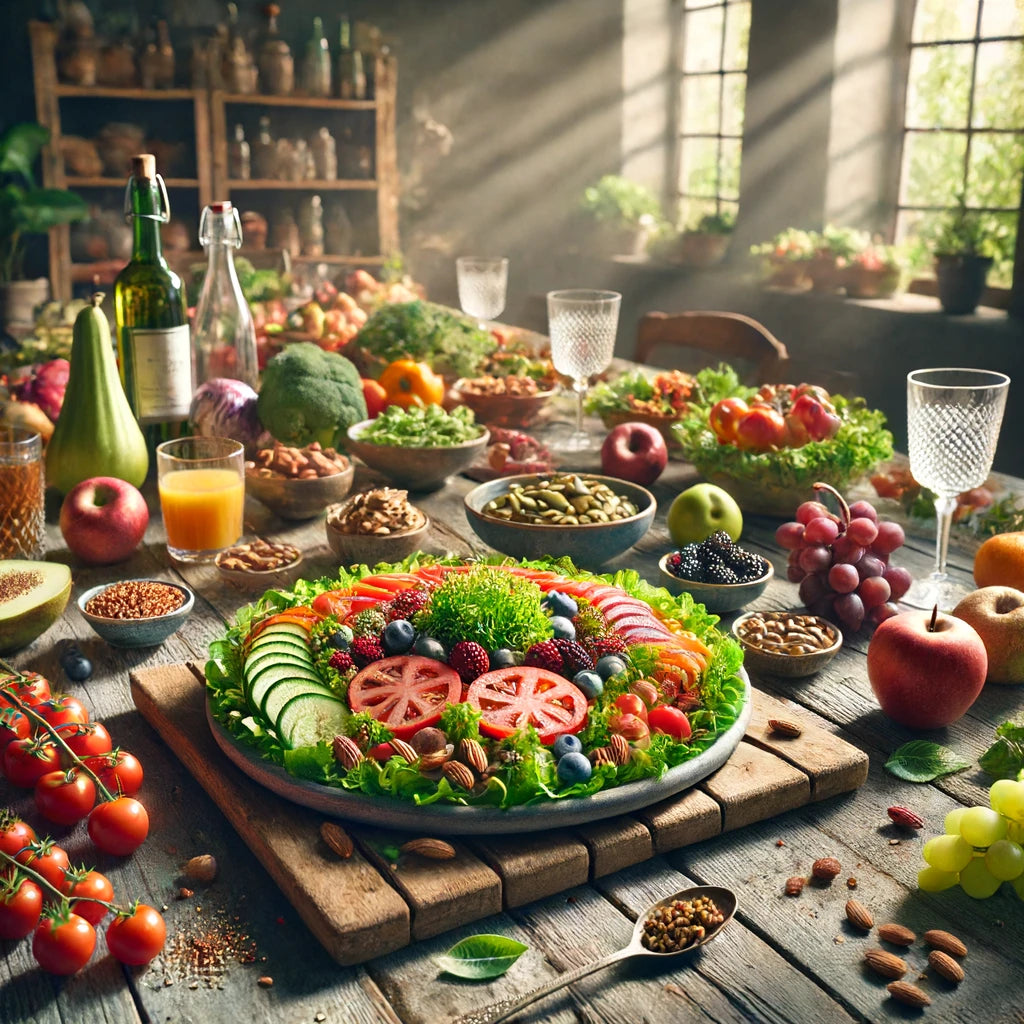
SALES FROM 01/07 TO 02/03: 20% AUTOMATICALLY DEDUCTED IN YOUR CART! FREE DELIVERY IN ALL EU, SWITZERLAND & UK FROM €70.
Navigation
Menu
Best foods to include in your diet
Listen to this article:
In this article, we will explore the best foods to include in a healthy diet. We will discuss the importance of superfoods, vegetables and fiber, as well as essential proteins. Hydration and health will also be at the heart of our concerns, as will the balance of food intake. Finally, discover some tips for cooking healthily.
Nature has given us an incredible wealth of nutrients and among these, small fruits clearly stand out. According to a Healthline study (2018), goji berries are particularly valued for their extraordinary nutritional potential. These small red fruits contain:
Seeds should not be neglected in a balanced diet. They are small but full of nutritional benefits. Chia seeds, for example, are recognized as a superfood thanks to their exceptional omega-3 and fiber content. Likewise, flax seeds stand out for their rich supply of lignans - phytochemical compounds with anti-cancer properties.
Whether berries or seeds, these foods can easily be integrated into our daily meals: in a smoothie for breakfast or sprinkled on a salad for lunch. It's time to welcome these natural gifts that nature gives us for a healthier lifestyle.

After exploring the kingdom of superfoods , we are embarked on another culinary adventure: that of vegetables and fiber . Essential to our well-being and health, these foods stand out for their incomparable nutritional richness.
vegetables, such as spinach or broccoli, are an incredible source of vitamins and minerals essential for our body. They are also loaded with dietary fiber which promotes digestion and provides a prolonged feeling of fullness.
Fiber-packed foods like oats or brown rice have a positive impact on digestive health, earning them praise. They play a crucial role in regulating blood sugar and cholesterol while facilitating good intestinal transit.
Frequently integrating these foods into your diet is a wise choice to preserve your health without compromising taste pleasure. So don’t hesitate to generously diversify your meals!
No diet is complete without a healthy serving of essential protein . These elements are the foundations of the body, participating in cell multiplication and tissue restoration. They play a crucial role in maintaining muscles and the proper functioning of the immune system.
Lean meats, such as chicken or fish such as salmon or tuna, provide a valuable source of protein. Eggs are also highly recommended for their concentration of essential amino acids.

Vegetarians are not left out since they can opt for protein-rich alternatives such as lentils, chickpeas or even quinoa. These foods are full of energy while being low in fat.
Introducing these protein sources into your diet can help improve your overall health while providing a lasting feeling of fullness.
Pure water is essential to our health, its importance lying in regular and sufficient consumption. It contributes to good hydration, promotes the transport of nutrients to the cells and facilitates the elimination of waste from the body. A minimum daily quantity of 1.5 liters is recommended for an adult in good physical condition.
In addition to pure water, we can cite natural juices as beneficial elements for health. It is preferable to opt for fresh juices without added sugar in order to obtain maximum nutritional benefits. Orange juice, for example, contains a large quantity of vitamin C which boosts the immune system; while that of beetroot could help reduce blood pressure thanks to its richness in nitrates. However, although healthy, these drinks should not replace the recommended daily volume of water.

In our pursuit of healthy eating, we should not overlook the importance of cooking methods. Indeed, ingredients cooked at high temperature or fried can lose a large part of their nutrients and accumulate potentially harmful substances. Instead, choose steam, oven or foil preparation which better preserves essential vitamins and minerals. Research published in Science Daily (2020) shows that regular consumption of leafy green vegetables cooked in this way helps improve our cardiovascular health.
Introducing food substitutes that are lower in fat is another helpful tip. Cottage cheese can replace crème fraîche, while butter can be replaced by natural yogurt in certain pastry recipes. Don't forget avocado either, a wonderful source of good fats and a creamy alternative to traditional sauces.
Take control of your sugar intake. In your homemade recipes, reduce the amount of added sugar or consider using natural substitutes like honey or stevia. Be careful, processed products can actually hide sugars. Learn to read labels and choose unsweetened products when possible.
Have you ever considered the importance of balance in your food intake? It is indeed a key element to preserve or improve your health.
To begin, it is necessary to mention proteins, whether they come from animal or plant sources. They contribute to the formation and renewal of body tissues.
Then, let's not lose sight of complex carbohydrates such as whole grains which deliver lasting energy without causing glycemic peaks.
You also need to control the amount of fat. Opt for those from plants such as oilseeds and avocado fruit which contain fatty acids beneficial to your body.
It is essential not to underestimate the intake of fiber generally present in fruits as well as vegetables for their role in the feeling of satiety and the proper functioning of the digestive system. Therefore, a diet must be diversified and harmoniously distributed in order to adequately meet the nutritional needs of the human body.
More articles on the same theme:
Submit your email to get updates on products and special promotions.